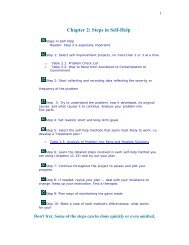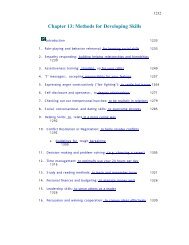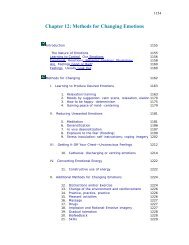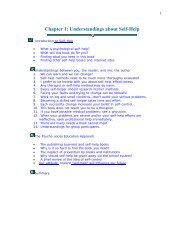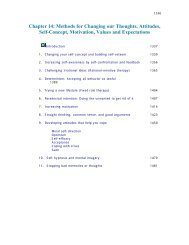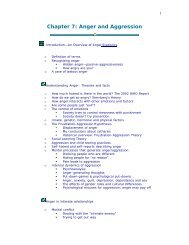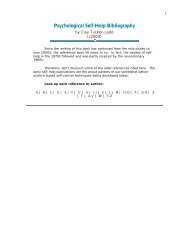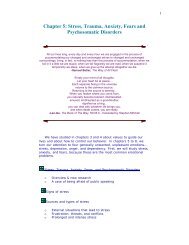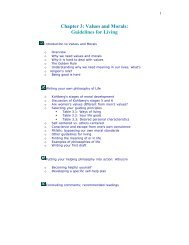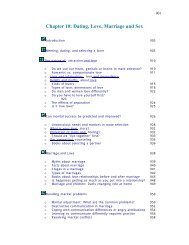Methods for Changing Behaviors - Psychological Self-Help
Methods for Changing Behaviors - Psychological Self-Help
Methods for Changing Behaviors - Psychological Self-Help
You also want an ePaper? Increase the reach of your titles
YUMPU automatically turns print PDFs into web optimized ePapers that Google loves.
advanced tasks (see chapter 4). Otherwise, unsatisfied needs will<br />
demand our attention and energy. This is a possible explanation <strong>for</strong><br />
many of our failures in self-improvement. And the implications of these<br />
failures are: (l) find out what unmet need is interfering with your<br />
progress, (2) satisfy that need, and (3) go back and try again to<br />
achieve the original self-improvement.<br />
Purposes<br />
· To identify and effectively cope with our basic physical, safety,<br />
belonging and love, and self-esteem needs, which, as long as<br />
those needs are unsatisfied, will undermine our ef<strong>for</strong>ts at<br />
mature love and self-actualization. Examples:<br />
Lower Needs Higher Needs Interfered With<br />
Procrastinate by playing<br />
or socializing<br />
Sexual conquests to<br />
build ego<br />
Staying dependent on<br />
parents<br />
Excessively seeking<br />
attention<br />
Responsible achievement<br />
Seeking love<br />
Becoming independent<br />
<strong>Self</strong>-esteem and mutual love<br />
Seeking a mate Fulfilling your potential<br />
STEP ONE: Discover the need(s) that is interfering with<br />
progress.<br />
The place to start, rather obviously, is by observing what needs<br />
(activities) are interfering with our achieving some goal. Read about<br />
Humanistic theories in the motivation section of chapter 4. Look<br />
especially <strong>for</strong> the needs to belong (have friends) and to be loved (be<br />
part of a family) as well as <strong>for</strong> self-esteem needs (feel competent,<br />
successful, worthwhile). These are the needs that most often interfere<br />
with being your real self, loving unselfishly, and living up to your<br />
potential. Using method #9 may be very helpful in finding your more<br />
basic needs.<br />
In addition, any of the methods at level V in chapter 15 could help<br />
identify your hidden basic needs. Notice that method #5, reframing, in<br />
chapter 15 is designed <strong>for</strong> exactly this purpose, and, furthermore, that<br />
method asks unconscious parts of us to devise acceptable ways <strong>for</strong><br />
meeting these needs. Here we are supposedly just dealing with the<br />
conscious mind, although we are not aware of the ways or the extent<br />
that lower needs are messing up our lives.<br />
STEP TWO: Plan ways to satisfy your unsatisfied basic needs.<br />
1093



